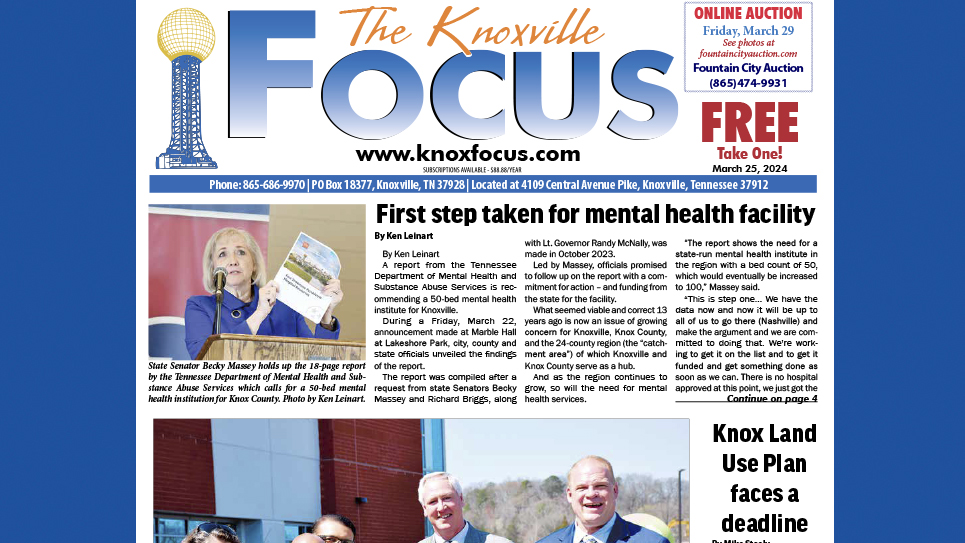First step taken for mental health facility
By Ken Leinart
A report from the Tennessee Department of Mental Health and Substance Abuse Services is recommending a 50-bed mental health institute for Knoxville.
During a Friday, March 22, announcement made at Marble Hall at Lakeshore Park, city, county and state officials unveiled the findings of the report.
The report was compiled after a request from state Senators Becky Massey and Richard Briggs, along with Lt. Governor Randy McNally, was made in October 2023.
Led by Massey, officials promised to follow up on the report with a commitment for action – and funding from the state for the facility.
What seemed viable and correct 13 years ago is now an issue of growing concern for Knoxville, Knox County, and the 24-county region (the “catchment area”) of which Knoxville and Knox County serve as a hub.
And as the region continues to grow, so will the need for mental health services.
“The report shows the need for a state-run mental health institute in the region with a bed count of 50, which would eventually be increased to 100,” Massey said.
“This is step one… We have the data now and now it will be up to all of us to go there (Nashville) and make the argument and we are committed to doing that. We’re working to get it on the list and to get it funded and get something done as soon as we can. There is no hospital approved at this point, we just got the recommendation.”
Massey and Briggs thanked Knox City, Knox County, and region municipalities and county mayors, as well as state officials for their support for the past 10 years in discussions and meetings regarding a mental health facility to serve the 24-county region.
“It’s been a difficult journey for Knoxville, but this report lays the foundation,” Lt. Governor Randy McNally said during the announcement.
But he had an optimistic view funding could be secured.
“Out of nine committee chairs, two are from Knoxville,” he said.
State Senators Becky Massey and Richard Briggs serve Knox County.
“All of you that care about mental health, care about Knoxville, and care about this region, it would be good of you to write a letter to the governor asking him to make this one of his priorities,” McNally said.
Knox County Mayor Glenn Jacobs also pointed out that the issue of helping those with mental health issues is not Knox County’s alone.
“I’m real excited about the possibilities and the potential this report lays out,” the mayor said.
“I’d also like to emphasize this is not just a Knoxville/Knox County issue. This is a regional issue.”
In 2010-2011 the state phased out Lakeshore Mental Health Institute, a 115-bed state inpatient psychiatric facility in Knoxville.
The recommendation to close Lakeshore was based on the declining average daily census (admissions), strong community behavioral health provider networks, and the presence of strong government and local hospital support.
An assessment at the time of long-term patients determined the majority of those remaining could be supported in the community.
During its last year, Lakeshore had 2,237 admissions with an average of 98 per day. The percentage of admissions with a length of stay less than 10 days was 91%.
In 2012 the state took Lakeshore’s $20.5 million annual funding and reinvested it in community programs.
“There were promises that were made. They promised our communities, and we’re talking about a 24-county region (the “catchment area” for Lakeshore) from Loudon County basically all the way up to Bristol. They promised the money that was spent running Lakeshore would stay and be used for mental health treatment in our community,” Massey said.
The promises were kept.
At first.
Massey said in Fiscal Year 2011 (when Lakeshore closed) there were 22,237 in-patient admissions at Lakeshore.
But in Fiscal Year 2023 there were 95,864 in-patient admissions from the former 24-county catchment area Lakeshore served.
The difference in dollars, Massey said, was some $53 million.
“We are a growing community and there are a growing number of individuals needing health care and there are a growing number of individuals that are having severe mental health needs,” Massey said.
Massey said the private sector hospitals were doing a “great job with the people they’re serving.”
But added, “There are different needs for those people.”
The patients of state-contracted private facilities and state-run regional mental health institutes are different, the study noted.
State-run facilities care more for those who are primarily uninsured, have higher needs, come from jail or court for evaluation, and have significant needs for discharge.
“This puts a burden on our local law enforcement… to transport from the jail those who have been court-ordered for evaluation, Massey said. “There are often times people have been waiting up to three months to get that court-ordered evaluation done and they are held in the jail until that time.”
Moccasin Bend Mental Health Institute took over the role as the “catchment area” that Lakeshore had held. Of the former 24 county catchment area Lakeshore served, Knox was the largest user. Moccasin Bend, located in Hamilton County (Chattanooga) saw 253 transports from the Knox County Sheriff’s Office in 2023 at $300 a trip or $75,900 for the 2022-2023 fiscal year.
Knox County Sheriff Tom Spangler said in a two-year period, July 2021 to June 2023, his department made 3,751 transports to mental health hospitals and more than 40% of those transports – 1,622 – were to hospitals more than 45 miles away.
In 2023 there were 51 transports from the Knox County Jail to Moccasin Bend with 22 of those being for forensic evaluation. Private contract facilities typically do not serve those coming from jail or who are court-ordered to have a forensic evaluation.
“If they go to Chattanooga for the hospitalization it disconnects them from the family and friends and other support,” Massey said.
032524_KNOX FOCUS







